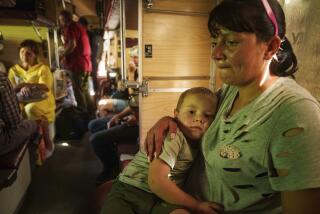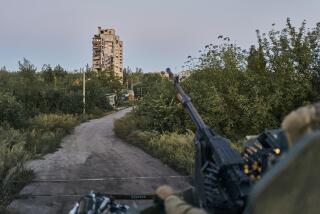Army Apparently Moving to Conquer 2 Croatian Cities : Yugoslavia: Red Cross appeals for negotiations to ‘spare innocent lives’ in Dubrovnik and Vukovar.
- Share via
BELGRADE, Yugoslavia — After a Serbian appeal for U.N. peacekeeping forces to end the fighting in Yugoslavia, the federal army intensified its assaults on two key Croatian cities Tuesday in an apparent effort to conquer them before foreign forces intervene.
The army’s barrage of mortar and artillery fire on the encircled Adriatic port of Dubrovnik and the devastated city of Vukovar in eastern Croatia has ratcheted the Yugoslav civil war to its deadliest level since fighting broke out in late June.
Tanjug, the federal news agency, reported that 140 Croatian national guardsmen have been killed in the last three days. It gave no death tolls for civilians or the Serbian-commanded army.
The International Committee of the Red Cross, deploring the mounting civilian casualties, appealed for negotiations to “spare innocent lives.”
About 50,000 people have refused to leave their homes in besieged Dubrovnik, Croatia’s most popular resort and an internationally recognized cultural monument. More than 12,000 people remain holed up in basements and shelters in Vukovar, which has undergone 11 weeks of bombardment by federal troops fighting to secure an expanded Serbia.
Serbian officials, who have usurped the authority of the crippled Yugoslav presidency, called over the weekend for U.N. troops to separate warring factions in Croatia. The conflict has killed at least 3,000--some say 5,000--over the last four months.
Croatian authorities back the idea of a peacekeeping force, but they want the troops deployed along their borders and only after the Yugoslav army has withdrawn.
If foreign forces separate the warring factions along the current battlefronts, they would in effect be protecting Serbia’s territorial gains. About one-third of Croatia has been conquered by the army and occupied by Serb militants opposed to its independence.
The army has stepped up air and ground assaults on Dubrovnik and Vukovar in an effort to put those prized territories under Serbian control before foreign troops arrive and halt the advance in Croatia, Western diplomats speculate.
However, there is no indication that a U.N. deployment is planned soon, and the United Nations is unlikely to send peacekeepers into Yugoslavia’s war zones until a stable cease-fire is achieved.
As fighting intensified between Croatian national guardsmen and the federal army, EC officials called for an emergency U.N. meeting to discuss the crisis.
Diplomats of the Western European trade bloc tried to arrange a temporary cease-fire to evacuate EC monitors from Dubrovnik, where federal gunboats have been blasting shells into the seaside hotels that flank the city’s medieval walled center. The Hotel Argentina, where EC monitors and some foreign journalists have been trapped, was among the buildings hit in the shelling.
Croatia’s once-lucrative Adriatic coast has been sealed off by a naval blockade as the federal army tries to force the holdouts to abandon Dubrovnik, which has no electricity and little food or water.
The army bombardment had been directed at the housing and marinas outside the historic walled Old Town until Monday, when the center’s architectural monuments suffered their first major damage from shells lobbed by the federal warships and artillery fire from infantry in the surrounding hills.
Croatian Radio told of even more intense assaults Tuesday including rocket attacks. Two monasteries were hit, and the harbor area was reported on fire.
Heavy fighting was also reported in Vukovar, where Serbian militants and Croatian national guardsmen have been fighting hand to hand and house to house for the last week. The army announced “final operations” against Vukovar more than a week ago, but it has been unable to rout the defiant Croats.
Croatia, Serbia and the federal army have signed at least 11 agreements to stop the shooting, but each cease-fire brokered by European Community diplomats has collapsed within hours. Neither Serbian President Slobodan Milosevic nor Croatian President Franjo Tudjman is fully in control of his republic’s forces, and the Western mediators accuse both of failing to order all troops under their control to abide by the cease-fires.
More to Read
Sign up for Essential California
The most important California stories and recommendations in your inbox every morning.
You may occasionally receive promotional content from the Los Angeles Times.














